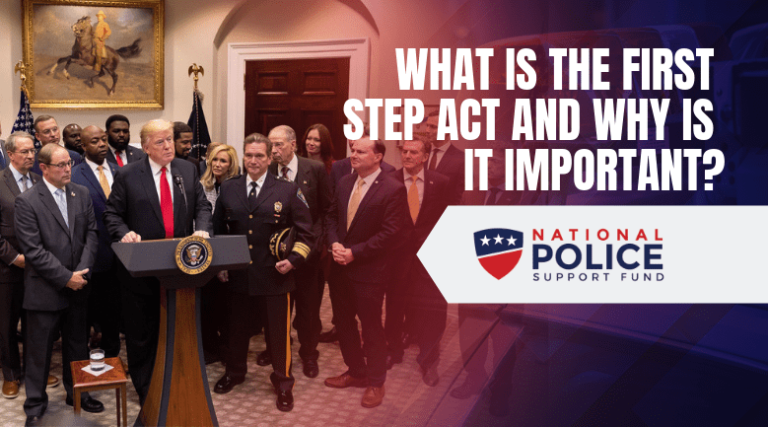 The FIRST STEP Act was passed by the United States House of Representatives and is awaiting action in the United States Senate. This Act would allow employees to store their firearms securely at federal prisons, as well as restrict the use of restraints on pregnant women, expand compassionate release for terminally ill patients, in some cases place prisoners closer to family, authorize new markets for Federal Prison Industries, mandate de-escalation training for correctional officers and employees, and make improvements to feminine hygiene in prisons.
The FIRST STEP Act was passed by the United States House of Representatives and is awaiting action in the United States Senate. This Act would allow employees to store their firearms securely at federal prisons, as well as restrict the use of restraints on pregnant women, expand compassionate release for terminally ill patients, in some cases place prisoners closer to family, authorize new markets for Federal Prison Industries, mandate de-escalation training for correctional officers and employees, and make improvements to feminine hygiene in prisons.
The FOP Voicing its Support for the FIRST STEP Act
The Fraternal Order of Police is voicing its support for this Act as it will reduce recidivism while at the same time make our communities safer.
“We are proud to announce that by working together with the Administration and leaders on Capitol Hill we have a bill that will make our streets and neighborhoods safer, our police better protected and improve the ability of our criminal justice system to effectively rehabilitate offenders,” said Chuck Canterbury, national president of the FOP.
If the FIRST STEP Act is Passed?
If the FIRST STEP Act is passed, it would ensure incarcerated individuals can earn the 54 days of good time credit per year, not just 47 days. This would retroactively apply to everyone in federal prison who has earned credit for good behavior which would yield a savings of $40 million in just the first year.
If the Act is passed, it would allow for 10 days in prerelease custody for every 30 days of successful participation, with no cap on the prerelease credit that can be earned. Other incentives include increased phone and visitation periods, transfer to institutions closer to one’s release residence and additional policies which can increase commissary spending, access to e-mail, and consideration of transfer.
If the Act is passed, availability of prerelease custody by requiring the Bureau of Prisons to transfer low and minimum risk prisoners to prerelease custody. This could be either a half-way house or home confinement. Bureau of Prisons will in effect be required to improve contracting with residential re-entry centers and improve current policies.
If the Act is passed, creation and expansion of life-changing classes by authorizing $250 million over five years to the Bureau of Prisons for the development and expansion of programming focused on skill-building, education and vocational training. These classes will help prepare individuals for a successful and lasting transition back into their communities. This also allows partnerships between nonprofits, volunteers, faith-based groups and other organizations to ensure classes are accessible to as many as possible.
If the Act is passed, prioritizing people within the prison because evidence shows individuals who are at the greatest risk of future crime are the most in need of treatment, classes, and counseling. To make legislation as effective as possible, it gives priority to incarcerated men and women who are classified as high and medium risk.
If the Act is passed, move prisoners closer to home because contact with family is one of the ost important aspects that help individuals reintegrate into society successfully. The bill mandates prisoners shall be placed within 500 driving miles of their families because the journey to visit loves ones in prison can be extremely burdensome and cost-prohibitive for families.
If the Act is passed, dignity for women by banning the shackling of pregnant women and extending those protections to three months after pregnancy. The bill required Bureau of Prisons to provide sanitary napkins and tampons to incarcerated women at no cost.
If the Act is passed, individuals are provided identification cards so if they leave the federal prison they already have their identification card. This will allow a quicker integration back into society as well as create significant cost savings of approximately $19 million.
If the Act is passed, expanding compassionate release by reducing the minimum age of prisoner eligibility for elderly from 65 years old to 60 years old and minimum time served by a prisoner eligibility for elderly release from 75% to 2/3. It also expands the program to all prisons.
If the Act is passed, hold the Bureau of Prisons accountable because the well-intentioned legislation can be thwarted or undermined during the implementation phase. Throughout the bill, there is language providing the Bureau of Prisons and the Attorney General shall do things, not just that they may do them. Specifically, the incarcerated individuals shall earn time credits for programming and that their credit shall be applied toward time in prerelease custody.
National Police Support Fund will continue to monitor the FIRST STEP Act. Follow us on social media or subscribe to our newsletter to get updates.








